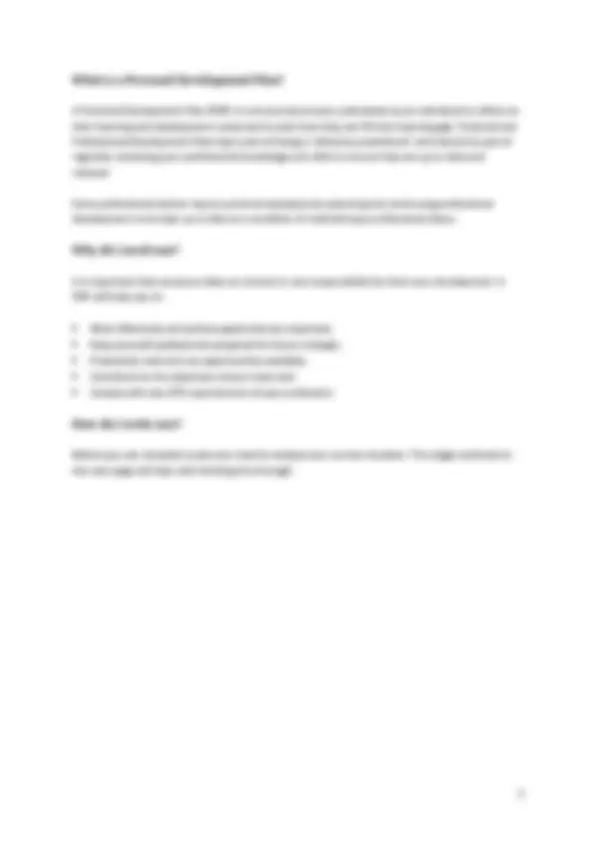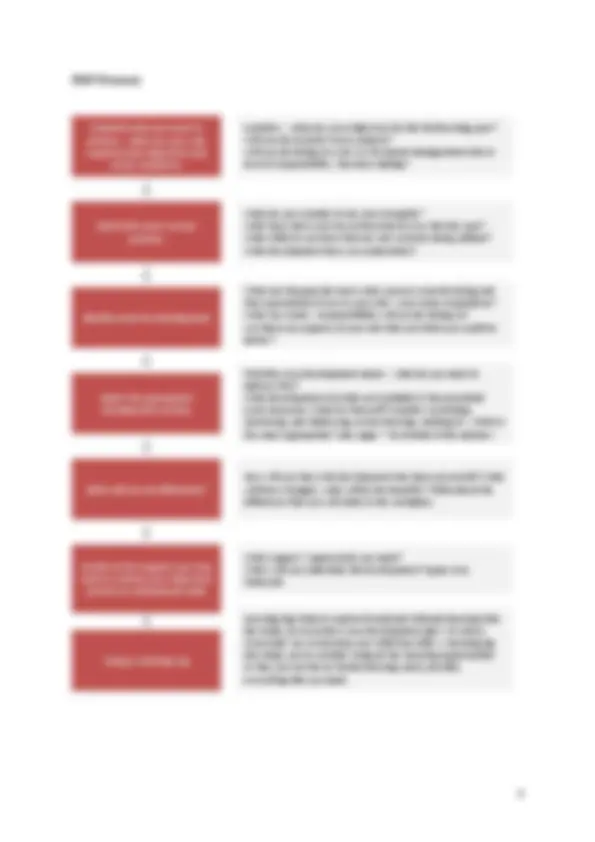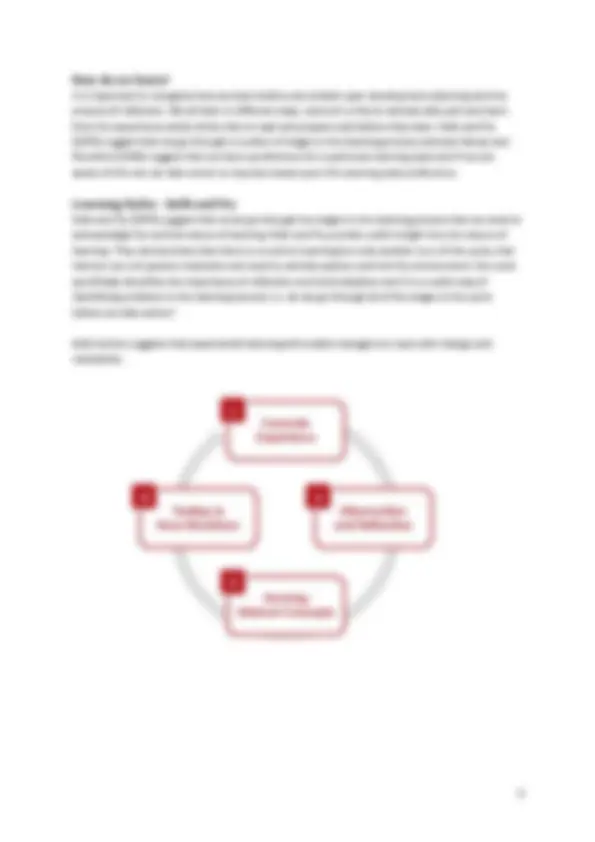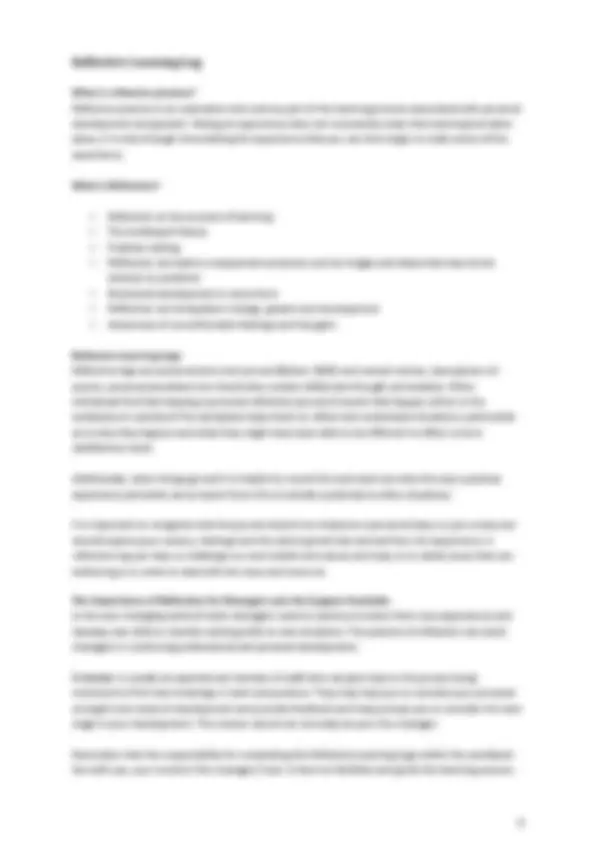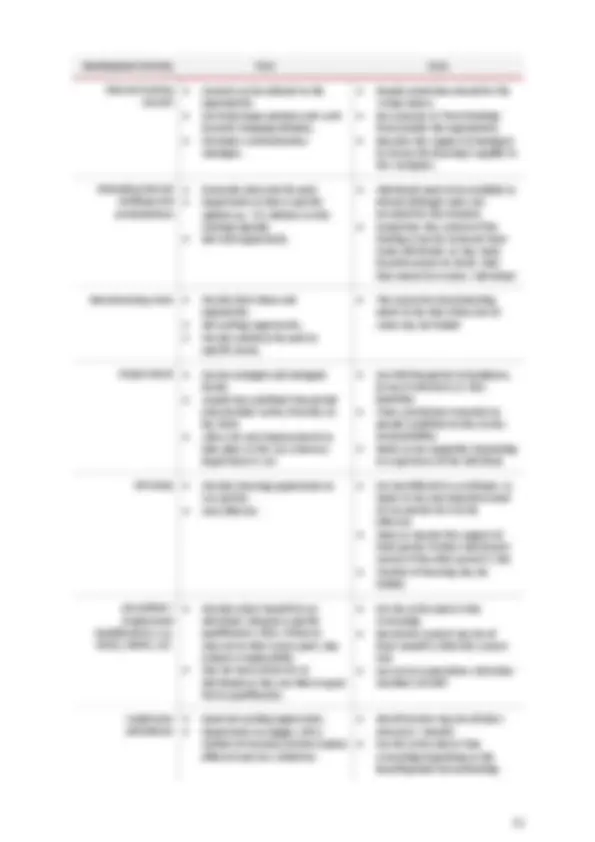Download Importance of Reflection in Personal and Professional Development and more Study notes Decision Making in PDF only on Docsity!
A Guide to Planning your Professional and
Personal Development
Organisational and Educational Development
- Contents Contents
- What is a Personal Development Plan?
- Why do I need one?
- How do I write one?
- PDP Process.............................................................................................................................................
- How do we learn?
- Learning Styles - Kolb and Fry
- Learning Styles - Honey and Mumford
- Activists:
- Reflectors:
- Theorists:.............................................................................................................................................
- Pragmatists:
- Personal Development Plan
- Reflective Learning Log
- What is reflective practice?
- What is Reflection?
- Reflective Learning Logs......................................................................................................................
- The Importance of Reflection for Managers and the Support Available
- Writing Your Reflective Learning Log
- Reflective Learning Log Description
- Learning and Development Options
- Transfer of Learning
PDP Process
Establish what you want to achieve – what are your role requirements/objectives and career ambitions.
Determine your current position
Identify areas for development
Select the appropriate development activity
What will you do differently?
Decide on the support you may need to achieve your objectives and set an achievement date
Using a Learning Log
Consider… what are your objectives for the forthcoming year? Will you be involved in any projects? Will you be taking on a new or increased management role or level of responsibility / decision making?
What do you consider to be your strengths? What have been your key achievements over the last year? What skills do you have that are not currently being utilised? What development have you undertaken?
What are the gaps between what you are currently doing and the expectations of you in your role / your career aspirations? What new tasks / responsibilities will you be taking on? Are there any aspects of your role that you think you could do better?
Prioritise your development needs – what do you need to address first? What development activities are available & the associated costs/resources /time for them all? Consider workshops, mentoring, job shadowing, action learning, reading etc. Which is the most appropriate? (See page 7 for details of the options.)
How will you know the development has been successful? What will have changed, what will be the benefits? Think about the difference that you will make in the workplace.
What support / approval do you need? When will you undertake the development? Agree on a timescale.
Learning logs help to capture formal and informal learning that has helps you to achieve your development plan. It is also a structured way to develop your reflection skills. A learning log also helps you to consider using ad hoc learning opportunities so they are not lost as formal learning rarely provides everything that you need.
How do we learn?
It is important to recognise how we learn before we embark upon development planning and the
process of reflection. We all learn in different ways, some of us like to actively take part and learn
from the experience whilst others like to read and prepare well before they learn. Kolb and Fry
(1975) suggest that we go through a number of stages in the learning process whereas Honey and
Mumford (1992) suggest that we have a preference for a particular learning style and if we are
aware of this we can take action to improve based upon this learning style preference.
Learning Styles - Kolb and Fry
Kolb and Fry (1975) suggest that as we go through the stages in the learning process that we need to
acknowledge the cyclical nature of learning. Kolb and Fry provide useful insight into the nature of
learning. They demonstrate that there is no end to learning but only another turn of the cycle; that
learners are not passive recipients and need to actively explore and test the environment, the cycle
specifically identifies the importance of reflection and internalisation and it is a useful way of
identifying problems in the learning process i.e. do we go through all of the stages in the cycle
before we take action?
Kolb further suggests that experiential learning will enable managers to cope with change and
complexity.
Concrete Experience
Observation and Reflection
Forming Abstract Concepts
Testing in New Situations
4
1
2
3
Personal Development Plan
Status Development Objective
What aspect of my
knowledge, practice, skills or
behaviours do I want to
develop?
Development Activity
How will I achieve this?
What are the most
appropriate development
activities?
What will I be doing
differently?
How will I know I have been
successful? What key
differences do you aim to
make in the workplace?
Support Needed?
What additional resources
or support will I need? Who
and/or what resources can
help?
Date for Achievement
Target Dates for review
/completion
☐ Planned
☐ In progress
☐ Completed
☐ Reflection
Start Date: Pick Date
Review: Pick Date
Completion: Pick Date
☐ Planned
☐ In progress
☐ Completed
☐ Reflection
Start Date: Pick Date
Review: Pick Date
Completion: Pick Date
☐ Planned
☐ In progress
☐ Completed
☐ Reflection
Start Date: Pick Date
Review: Pick Date
Completion: Pick Date
Reflective Learning Log
What is reflective practice?
Reflective practice is an evaluative tool used as part of the learning process associated with personal
development and growth. Having an experience does not necessarily mean that learning has taken
place, it is only through internalising the experience that you can then begin to make sense of the
experience.
What is Reflection?
- Reflection on the process of learning
- The building of theory
- Problem solving
- Reflection can lead to unexpected outcomes such as images and ideas that may be the
solution to problems
- Emotional development in some form
- Reflection can bring about change, growth and development
- Awareness of uncomfortable feelings and thoughts
Reflective Learning Logs
Reflective logs are personal and unstructured (Bolton 2001) and contain stories, descriptions of
events, personal anecdotes but should also contain deliberate thought and analysis. Often
individuals find that keeping a personal reflective journal of events that happen either in the
workplace or outside of the workplace helps them to reflect and understand situations, particularly
as to why they happen and what they might have been able to do different to effect a more
satisfactory result.
Additionally, when things go well it is helpful to record this and work out why this was a positive
experience and what can be learnt from this to transfer positively to other situations.
It is important to recognise that the journal should not simply be a personal diary or just a story but
should explore your actions, feelings and the learning that was derived from the experience. A
reflective log can help us challenge our own beliefs and values and help us to clarify issues that are
bothering us in order to deal with the issue and move on.
The Importance of Reflection for Managers and the Support Available
In the ever changing world of work managers need to continue to learn from new experiences and
develop new skills or transfer existing skills to new situations. The practice of reflection can assist
managers in continuing professional and personal development.
A mentor is usually an experienced member of staff who can give help to the person being
mentored to find new meanings in work and practice. They may help you to consider your personal
strengths and areas of development and provide feedback and help prompt you to consider the next
stage in your development. The mentor would not normally be your line manager.
Remember that the responsibility for completing the Reflective Learning Logs within the workbook
lies with you, your mentor/ line manager/ tutor is there to facilitate and guide the learning process
Reflective Learning Log Description
Stage 1: Describe the learning activity
Describe in detail the development event that you are reflecting on. Include, for example, where
were you; who else was there; why were you there; what were you doing; what were other people
doing; what was the context of the event; what happened; what was your part in this; what parts
did the other people play; what was the result.
Stage 2: Describe your Observations and Reflections
At this stage try to explore how you were feeling – what was going on inside your head. Describe
how you were feeling when the activity started; what you were thinking about at the time; how did
other people make you feel; how did you feel during and about the outcome of the event; what do
you think about it now.
How did your feelings influence your behavior, i.e. what did you say or do?
Also, describe any ‘key moments’ or ‘key observations’, e.g. something someone said or something
that was taught that had an impact on you or particularly chimed with you for some reason.
Describe why it was a ‘key moment’ for you. Key observations could include how you noticed
others responded and/or they maybe a model or theory that made sense or helped you with your
understanding.
Consider what was good and/or bad about the learning event or experience or what went well or
worked well or didn’t go so well for you.
Stage 3: Key learning points and conclusions
At this stage, describe the key learning points or outcomes for you, e.g. aspects of the activity that
were particularly relevant or stood out to you.
What conclusions do you draw from the learning?
If the learning activity was a workshops, you should try to relate the learning to your practice in
the workplace. By doing this you are likely to develop insight into you own and other people’s
behaviour in terms of how they contributed to the outcome of an event.
Remember the purpose of reflection is to learn from an experience. Without detailed analysis and
honest exploration that occurs during all the previous stages, it is unlikely that all aspects of the
event will be taken into account and therefore valuable opportunities for learning can be missed.
During this stage you should ask yourself what you could have done differently.
Stage 4 : So what? - Action Planning
During this stage you should think yourself forward into encountering the event or workplace
scenario again and to plan what you would do – would you act differently or would you be likely to
do the same? Here the cycle is tentatively completed and suggests that should the event occur
again it will be the focus of another reflective cycle
Learning and Development Options
Listed below are a range of development options which can be considered when deciding how to
meet a development needs along with their associated pros and cons. Learning style preferences
also have a bearing on the most appropriate development activity to meet your needs and the
development needs of your team.
Financial implications are clearly a factor too when determining development activities, however,
not all development solutions need be costly. Managers and individuals need to be creative when
considering development options available to them. Also, being clear about how you will measure
the success of any development activity is also key to identifying the right option.
Development Activity Pros Cons
Work shadowing • Opportunity to directly observe and ask questions throughout a process / activity.
- Relevant to the learner (i.e. usually a task they need to learn to do)
- Cost effective
- Relies on experience and skill of the person being shadowed
- Possible to pick up bad habits / practices
Coaching (^) • Focuses specifically on the performance / requirements of the individual.
- Requires people to transfer the learning to real work situations - Requires skill on the part of the coach - Can be costly, if an external coach is used.
Mentoring (^) • Focuses specifically on the individuals needs
- Opportunity to learn directly from someone with particular experience or knowledge - Requires skill on the part of the mentor. - Generally longer term, so can be some time before benefits are experienced in the work place
Action Learning (^) • Involves those who own problems and are best qualified to solve them
- Good method for developing people in their organisation
- It requires individuals to commit to take action, - It needs to be well structured and facilitated to work well. - Relies on people being open and prepared to share their situations. - Diary co-ordination of the group can be a challenge.
Delegated tasks and projects
- Shows trust and confidence in the individual
- Frees the manager to do other work
- Directly relevant way of developing staff - Requires confidence and faith in others - Time commitment in the short term for longer term payoff - With heavy workloads, there can be resistance to take on delegated work
Reading assignments • Cost effective
- Easy to access
- Flexible in terms of when it is undertaken
- Works well if supported by additional development, i.e. follow up discussions / de-brief - Lack of interaction and opportunity to ask questions - No guarantee the learning will ‘stick’ - Might just have a one sided view
Development Activity Pros Cons
Internal training courses
- Content can be tailored to the organisation.
- Can help shape opinions and work towards changing attitudes.
- Promotes communication messages. - People sometimes attend for the wrong reason. - No exposure to ‘fresh thinking’ from outside the organisation. - Requires the support of managers to ensure the learning is applied in the workplace.
Attending internal briefings and presentations
- Generally short and focused.
- Opportunity to hear a specific update e.g. VC’s address on the strategic agenda.
- Network opportunity
- Individuals need to be available to attend (although many are recorded for the intranet).
- Sometimes the content of the briefing is too far removed from some individuals, so may need local discussion to clarify what that means for a team / individual.
Benchmarking visits • Provide fresh ideas and approaches.
- Networking opportunity.
- Provide solutions focused to specific issues. - The reason for benchmarking needs to be clear otherwise its value may be limited
Project Work (^) • Can be arranged and managed locally
- Usually has a defined time period and provided variety from day to day tasks
- Allows for real improvements to take place in the way a team or department is run - Can fail through lack of guidance, terms of reference or clear deadlines - Time commitment required by people in addition to day to day responsibilities - Needs to be supported, depending on experience of the individual.
Job-swap (^) • Provides learning opportunity to two parties.
- Cost effective.
- Can be difficult to co-ordinate, i.e. needs to be a development need of two parties for it to be effective.
- Likely to require the support of third parties if either individual is unsure of the other person’s role.
- Transfer of learning may be limited.
Accredited / Professional Qualifications, e.g. NVQ's, MBA's, etc.
- Provides direct benefit to an individual who gain a specific qualification which, if directly relevant to their career path, may enhance employability.
- May be more attractive to individuals as they are likely to gain from a qualification. - Can be costly and/or time consuming. - Not all the content may be of direct benefit within the current role. - Can set an expectation with other members of staff.
Conference attendance
- Good networking opportunity.
- Opportunity to engage with a number of sessions and learn about different and new initiatives. - Not all session may be of direct relevance / benefit. - Can be costly and/or time consuming depending on the benefit gained from attending.
Transfer of Learning
Whatever the method, managers should not assume that people will automatically be able to use
their new-found knowledge or skills in their own role. It is not always that simple.
When considering any development needs, always be clear about what you expect an individual to
do differently or what you expect that they will be doing that will confirm the development was
worthwhile. This will enable you to select the most appropriate method of development to ensure
that people are able to transfer the learning gained to their work situation.
When selecting a development activity, ensure that:
- The development activity and the development need are similar
- There is an immediate link between the development activity and the role requirement.
- There will be a benefit for using the knowledge or skills in the workplace, i.e. it will improve
working methods / efficiency
- People are encouraged (by their manager or peers) to try our new skills and approaches
sooner rather than later.

